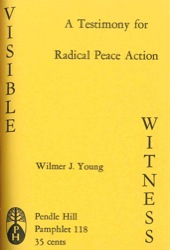Synopsis
Jailed as a protester against war, the author reflects on his 70 years outside prison.
About the Author(s)
Wilmer Young was born into an Iowan Quaker family in 1887 and attended the Scattergood and Westtown Friends schools before studying at Haverford College. Following graduation, he worked in Verdun with the American Friends Service Committee (AFSC). This position started as an alternative to fighting in World War I, and ended with Wilmer and his wife Mildred Binns Young coordinating AFSC feeding efforts in Poland years after the war’s end. Upon his return to the United States, Wilmer worked as a math teacher and the dean of boys at Westtown School. This work proved a brief hiatus from the social justice work that defined his life. He and Mildred continued to work with the AFSC, particularly after the Depression swept across the country. During the summer of 1934, he directed the first Quaker work camp held in the United States. Two years later, he started the Delta Cooperative, which sought to improve the lot of tenant farmers in the Mississippi Delta. He pursued this concern for rural southerners until 1955, before he came to Pendle Hill.
At Pendle Hill Wilmer became a peace activist and spent the next twenty-five years protesting nuclear proliferation, chemical weapons and the Vietnam War. Visible Witness describes a protest in Omaha, Nebraska where Wilmer engaged in civil disobedience for the first time. He worked with the Committee for Non-Violent Action, the Peace Action Center, A Quaker Action Group and the Peace & Social Order Committees of the Philadelphia Yearly Meeting. At the age of 80, he retired from active confrontation, but continued to work on Quaker concerns. He served on AFSC committees until close to the end of this life. He was active with the Monthly Meeting of Friends of Philadelphia and accepted reappointment to its Social Concerns Committee at age 93. He died at age 95, in 1983.
Pendle Hill Pamphlet #118






